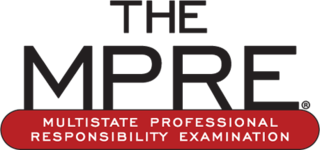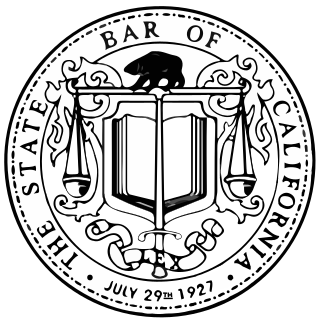Related Research Articles
An attorney at law in the United States is a practitioner in a court of law who is legally qualified to prosecute and defend actions in court on the retainer of clients. As of April 2011, there were 1,225,452 licensed attorneys in the United States. A 2012 survey conducted by LexisNexis Martindale-Hubbell determined 58 million consumers in the U.S. sought an attorney in the last year and that 76 percent of consumers used the Internet to search for an attorney.

Admission to the bar in the United States is the granting of permission by a particular court system to a lawyer to practice law in the jurisdiction and before those courts. Each U.S. state and similar jurisdiction has its own court system and sets its own rules for bar admission, which can lead to different admission standards among states. In most cases, a person is "admitted" or "called" to the bar of the highest court in the jurisdiction and is thereby authorized to practice law in the jurisdiction. Federal courts, although often overlapping in admission standards with states, set their own requirements for practice in each of those courts.

In law, the bar is the legal profession as an institution. The term is a metonym for the line that separates the parts of a courtroom reserved for spectators and those reserved for participants in a trial such as lawyers.
Legal ethics are principles of conduct that members of the legal profession are expected to observe in their practice. They are an outgrowth of the development of the legal profession itself.

The Law School Admission Test is a standardized test administered by the Law School Admission Council (LSAC) for prospective law school candidates. It is designed to assess reading comprehension as well as logical and verbal reasoning proficiency. The test is an integral part of the law school admission process in the United States, Canada, the University of Melbourne, Australia, and a growing number of other countries.
A bar examination is an examination administered by the bar association of a jurisdiction that a lawyer must pass in order to be admitted to the bar of that jurisdiction.

The Multistate Professional Responsibility Examination (MPRE) is a 120-minute, 60-question, multiple-choice examination designed to measure the knowledge and understanding of established standards related to a lawyer's professional conduct. It was developed by the National Conference of Bar Examiners and was first administered in 1980.

The State Bar of California is California's official attorney licensing agency. It is responsible for managing the admission of lawyers to the practice of law, investigating complaints of professional misconduct, prescribing appropriate discipline, accepting attorney-member fees, and financially distributing sums paid through attorney trust accounts to fund nonprofit legal entities. It is directly responsible to the Supreme Court of California; however, its Trustees are now appointed by the Supreme Court, the California Legislature, and Governor of California. All attorney admissions are issued as recommendations of the State Bar, which are then routinely ratified by the Supreme Court. Attorney discipline is handled by the State Bar Office of Chief Trial Counsel, which acts as prosecutor before the State Bar Court of California.

Barbri is a company headquartered in Dallas, Texas, whose primary product offering is a bar review course. Because of the general difficulty of state bar exams a majority of law school graduates choose to take some form of preparation course. Barbri offers law school graduates a six to seven week review course which features lectures by law professors on the seven major areas covered on the Multistate Bar Examination (MBE) – torts, contracts, real property, evidence, criminal law, civil procedure and constitutional law – along with additional lectures on the specific law of the state in which the participant plans to take the bar.
In order to be registered as a patent agent or patent attorney in the United States, one must pass the United States Patent and Trademark Office (USPTO) registration examination, officially called the Examination for Registration to Practice in Patent Cases Before the United States Patent and Trademark Office and known informally as the patent bar.
The performance test or "PT" is a section of bar examinations in the United States that is intended to mimic a real-life legal task that future lawyers may face. Of the three parts of most states' bar exams -- MBE, essay, and performance test—the performance test is supposed to be the most reflective of how well a candidate will perform outside of an academic setting.
The Louisiana Bar Exam is a three-day-long bar examination used to determine whether a candidate is qualified to practice law in the state of Louisiana. It is the longest bar exam in the United States, consisting of 21 hours of examination on nine topic areas. To sit for the exam, an applicant must graduate from an ABA-accredited law school and be deemed of good moral character.

The Rhode Island Bar Association is the unified (mandatory) bar association of the U.S. state of Rhode Island.
The South Carolina Bar is the integrated (mandatory) bar association of the U.S. state of South Carolina.
Qualified Lawyers Transfer Scheme (QLTS) is a series of two examinations for the license to practice as a solicitor in England and Wales designed for foreign-licensed lawyers. The QLTS supplanted the Qualified Lawyers Transfer Test (QLTT) on 1 September 2010. The QLTS assessment was designed to increase the number of recognised foreign jurisdictions for the examinations. These changes have opened up the English legal market to qualified lawyers from places as diverse as Korea, Japan and Russia.

The Florida Bar is the integrated bar association for the state of Florida. It is the third largest such bar in the United States. Its duties include the regulation and discipline of attorneys. The Florida Bar is also responsible for the governing of Florida Registered Paralegals.
As of June 2020 there are eleven recognized universities in Uganda, that offer education in law. There is, in addition, one specialised school, the Law Development Centre, that teaches aspects of the law that the universities do not teach. The Centre prepares and tests candidates for the Uganda Bar Examination.

In the United States, those seeking to become lawyers must normally pass a bar examination before they can be admitted to the bar and become licensed to practice law. Bar exams are administered by states or territories, generally by agencies under the authority of state supreme courts. Almost all states use some examination components created by the National Conference of Bar Examiners (NCBE). Forty-one jurisdictions have adopted the Uniform Bar Examination (UBE), which is composed entirely of NCBE-created components.
References
- ↑ Admissions Unit, Admission to the Practice of Law Archived December 13, 2008, at the Wayback Machine
- ↑ "National Conference of Bar Examiners, Multistate Bar Exam (MBE)". Archived from the original on December 17, 2008.
- ↑ http://www.azcourts.gov/Portals/26/admis/2015/AARules_Jan2015.pdf [ bare URL PDF ]